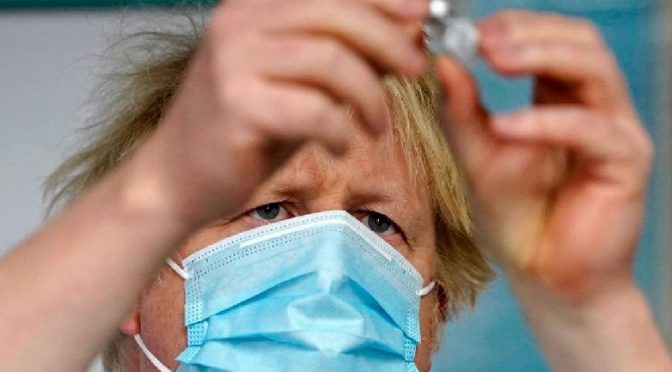51%
Only days after it was announced that 51% of British adults have received at least one doses of their COVID vaccine, Prime Minister Boris Johnson has said that people may need to present a vaccination certificate in order to go to the pub. One month ago, Johnson had said that this would not be the case.
One Year Later
When the UK first entered lockdown one year ago, Johnson recognized he was “taking away the ancient, inalienable right of free-born people of the United Kingdom to go to the pub” but now he is suggesting limits on how many of them will be given back that right.
British political analyst and commentator Jonathan Sacerdoti says the UK’s vaccination program has been impressive, beating the rest of Europe by far. “This has been for three main reasons,” he explains. “Firstly, the UK implemented skillful procurement of vaccines, which enabled the country to ensure a plentiful if varying supply level of the newly developed vaccines. Having finally broken free of the European Union after years of Brexit back-and-forth, the UK was able to make its own decisions just in time, and signed early and favorable contracts with vaccine manufacturers.”
AstraZeneca
“Secondly, the UK also invested in developing its own vaccine, the Oxford AstraZeneca vaccine. This has offered a far cheaper alternative to the Pfizer BioNtech vaccine which the UK is also using, and is far easier to transport. It does not require the deep refrigeration that some other vaccines do, and it can therefore also be administered in pharmacists and smaller medical practices, or even in old age homes, rather than only in mass vaccination centers. Despite some concerns over possible blood clots as a side effect, the vaccine is widely accepted to be safe and effective. It has enabled the UK to make progress with vaccinating its population quickly, and promises to help vaccinate poorer countries around the world.”
Extended Dosage Gap
“Thirdly, the UK made the controversial decision to extend the gap between the two vaccine doses each person needs, from 21 days to 12 weeks. This was not backed up but he vaccine makers’ research, but was based on wider knowledge of immunology and how other vaccines have been developed. At the time it was seen as highly controversial and even risky. But ongoing testing for antibodies has shown a continued, strong immune response even with the prolonged gap. This single decision has enabled the country to effectively provide a high level of protection to double the number of people in the same time. As long as vaccine supply and availability continue uninterrupted, the second doses will be given within 12 weeks and the population will continue to benefit both individually and as a whole.”
EU Lags
Meanwhile, the European Union is lagging far behind in its rate of vaccination, causing a rift between the bloc and its recent ex-member state the UK. Threats of banning or controlling exports of vaccines manufactured in the EU to countries which are far ahead in their programs has caused a diplomatic war of words. The UK determined to have its commercial contracts fulfilled regardless of the EU’s weak performance in acquiring and administering vaccines. The EU is desperate to claw back more vaccines for use in its own countries, despite slow progress in administering them.
Jonathan Sacerdoti is a British broadcaster and social commentator, widely featured on British and international television and media. He provides commentary for a wide range of TV stations including regular appearances on the BBC (including on their international show Dateline London) and the UK’s Sky News. He also appears on Channel 4 News, Al Jazeera English, NDTV in India, France 24, i24News Cheddar News and others. He has been published by the Daily Telegraph, The Spectator, the New Statesman and Jewish Chronicle. He is also a well-known campaigner on racism issues.


Leave a Reply
You must be logged in to post a comment.